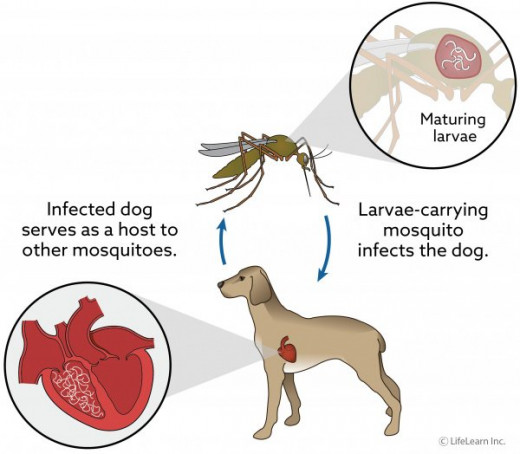- HubPages»
- Pets and Animals»
- Dogs & Dog Breeds»
- Dog Health
Dog Heartworm Misconceptions

Dog heartworm or heartworm disease in dogs has always been a major life-threatening issue. Because this disease is easily preventable, it is amazing that dog owners throughout the country have such a negligent attitude about it. This past year, the American Heartworm Society released a new study showing that heartworm disease throughout the fifty states has increased.
Dog Heartworm is easily preventable by giving a medication monthly. Why would anyone decide not to provide this treatment for their canine companion? A Heartworm preventative should be given every month. It is simple to give and comes in the form of Chewable tablets, topical ointments, and flavortabs. If you fall in the category of pet owners who find it difficult to remember to give medications, you can sign up and receive monthly e-mails or postcard reminders. Also, every package of heartworm medicine contains a sticker that you can put on your refrigerator or place in your calendar to help you remember
Dogs should get a blood test for heartworms once a year. This is recommended even if your dog is on the monthly preventative. Dogs that vomit their medication, doses that are accidentally skipped and dogs who spit out their medications are all reasons why yearly tests are recommended.
There are many common misconceptions about heartworm in dogs. The major misconception is the lifespan of the heartworm. Heartworms have a very long life cycle, so it takes 6 to 8 months from the time the infection occurs before a dog will test positive. This can explain why a dog that tests negative who is given preventative every month for a year might test positive the next year.
Another common misconception is that indoor pets do not need to be given a monthly preventative. Even if your dog never leaves the house to go for a walk, play or go to the bathroom, it should still be on a preventative. Mosquitoes can and do get in the house. It only takes the bite of one infected mosquito to transmit heartworms.
If your dog has a huge or thick coat you might question the necessity of giving heartworm preventative. Do not underestimate the non-stop efforts of mosquitoes. They will find a way to get a vampires' meal through any thick coat.
A very careless excuse that people will give for not using heartworm preventative is that they have had dogs for years and they never got the disease before. You could probably let your dog run loose in your yard without a fence for many years without him ever running away, but is that really a good idea?
One major misconception is that heartworm can only infect dogs. It can infect cats and many other species as well. Heartworm disease of cats poses some major problems. Cats have more serious symptoms than dogs and can even die very quickly when heartworm dies within their body.
Dog heartworm disease should be taken very seriously, and a minimal precaution of taking a preventative is necessary.
- Heartworm Medicine
Heartworm medicine discussed within this article will be referring to the preventive medicine, rather than medicine used as a treatment. In addition, the differences between heartworm disease in the dog and in...




